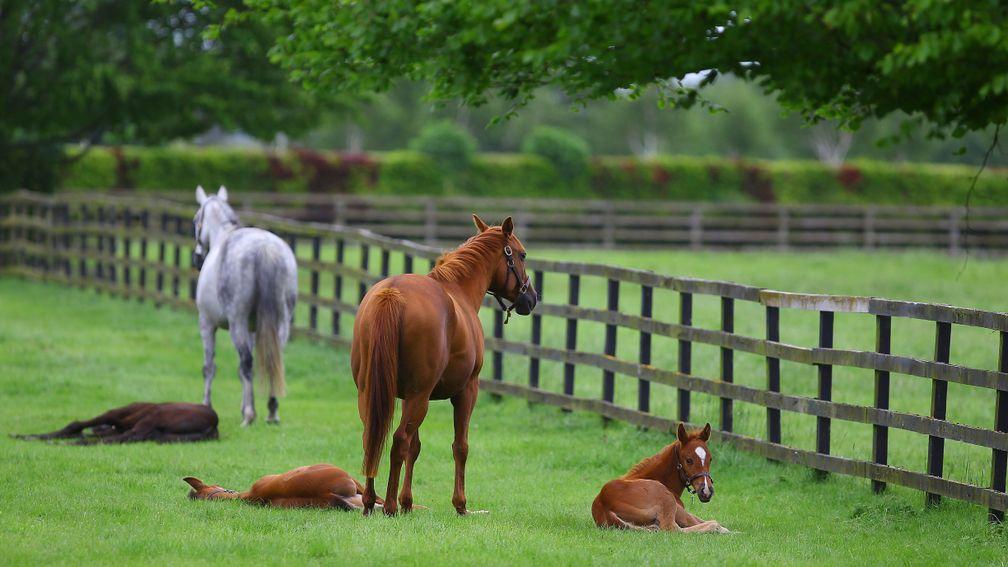How new five-year welfare strategy could affect the bloodstock industry
Ollie O'Donoghue attended the launch on Thursday

The bloodstock industry has much to chew over in the Horse Welfare Board's five-year strategic plan for the welfare of horses bred for racing, a 130-page document presented for the first time at 75 High Holborn on Thursday.
Four key outcomes were identified with traceability across the lifetimes of horses bred for racing seen as a key element of "collective, lifetime responsibility".
The board states that the "lifetime duty of care starts with the decision to breed a thoroughbred in the first place, where there is a need to ensure sustainable and responsible production", which is later described as the production of "high-quality bloodstock, where supply does not exceed demand".
Explaining the concept of lifetime responsibility before racing, the board explains how it "starts with breeders and owners taking responsibility for the welfare of foals, stallions and mares" and that "breeding practices should be underpinned by clear ethical principles".
Most breeders will be familiar with the requirement to register a foal's birth within 30 days, and this growing data set will be analysed in the coming years to gain "a clear understanding of the gap between the number of 30-day foal registrations and the number of horses that enter training".
Among the critical traceability data points before racing are foal registration details; 30-day foal notifications; export certificates; sales catalogue records; whereabout forms; horses flagged up as eligible to race; ownership transfer forms; and out-of-competition tests.
After racing these include horses flagged up as ineligible to race; ownership transfer forms; out of training status updates; registration with the Retraining of Racehorses; new ownership details; and data held by bodies such as British Eventing, British Dressage and the British Showjumping Association.
Another key priority over the next five years is to achieve "100 per cent traceability of a horse's first step away from racing and a clear understanding of where these horses go".
A particular onus is also placed on breeder education, to ensure responsible breeding practices and to ensure that standards
required in regulated sectors are respected and applied in the breeding sector.
The BHA and TBA should continue to play a representative role in conversations around natural breeding versus artificial insemination, with the board having listened to a range of opinions relating to the pros and cons, from a welfare perspective, of the different breeding methods.
The board also seeks the introduction of a euthanasia code covering the whole industry, including breeding, pre-training, sales and aftercare, building on existing codes and including a clear decision tree to ensure euthanasia is used appropriately. It suggests this code should be communicated to industry and external audiences, to encourage understanding of responsible, ethical euthanasia as an important element of the welfare toolkit.
Horseracing also runs the risk of reputational damage should welfare issues arise in relation to any horses sent abroad.
Overseas exports are not currently fully covered by BHA regulation and the board encourages "working with sales houses to ensure a responsible approach to overseas sales and to restrict sales or exports where there is evidence of risk".
Despite much of the breeding, pre-training, sales, and post-racing phases falling outside the BHA's regulatory remit - which is restricted largely to the racing, racecourse and training sectors - the board recommends that "the same standards of welfare, safety and traceability are applied in non-regulated parts of racing".
The board states that "all parts of the industry, not just the regulated sport, have a role to play in identifying and minimising risks" of reputational damage from areas not fully covered by BHA regulation.
Robust evidence and data are described as essential to achieving each of the four outcomes. The board notes that a clearer distinction between data collected for regulatory reasons and data and information collected for research and understanding could benefit the sport, while commercial agreements are seen as a potential challenge in collating data which is essential to traceability.
In addition, the board recommends bringing together existing data projects under a single, industry-wide unit, which could have potential benefits, including cost, and the creation of a Welfare Data Unit, to be scoped as part of a Welfare Data Programme.
The Horse Welfare Board includes representation from racing’s tripartite system of governance - the BHA, the horsemen and the racecourses - alongside independent perspectives from outside the industry. British breeders have a say in the BHA and Horsemen's Group through the TBA.
Among those in attendance at the launch of the strategic plan were Nick Craven, communications director of Weatherbys; Claire Sheppard and James Crowhurst, chief executive and trustee of the TBA respectively; and David Sykes, director of equine health and welfare at the BHA.
More to read...
Flat studs' loss is McCarthys' gain as they welcome Crystal Ocean to The Beeches Stud
Billy Mangan keeps step with brother Jimmy by breeding two unbeaten festival fancies
No Risk At All takes the baton from Martaline at Haras de Montaigu
Published on inNews
Last updated
- Breeding right to Blue Point sells for €430,000 on Darley winning bid platform
- Classic hero Metropolitan set for strong home support with Etreham busy at the sales
- 'It has been nothing short of incredible' - Grace Hamilton on Godolphin Flying Start experience
- ‘She’s one of the best two-year-olds in Europe’ - bluebloods set to go down a storm at Arqana Breeding Stock Sale
- HRI announces academy hurdles for unraced three-year-olds starting next season
- Breeding right to Blue Point sells for €430,000 on Darley winning bid platform
- Classic hero Metropolitan set for strong home support with Etreham busy at the sales
- 'It has been nothing short of incredible' - Grace Hamilton on Godolphin Flying Start experience
- ‘She’s one of the best two-year-olds in Europe’ - bluebloods set to go down a storm at Arqana Breeding Stock Sale
- HRI announces academy hurdles for unraced three-year-olds starting next season